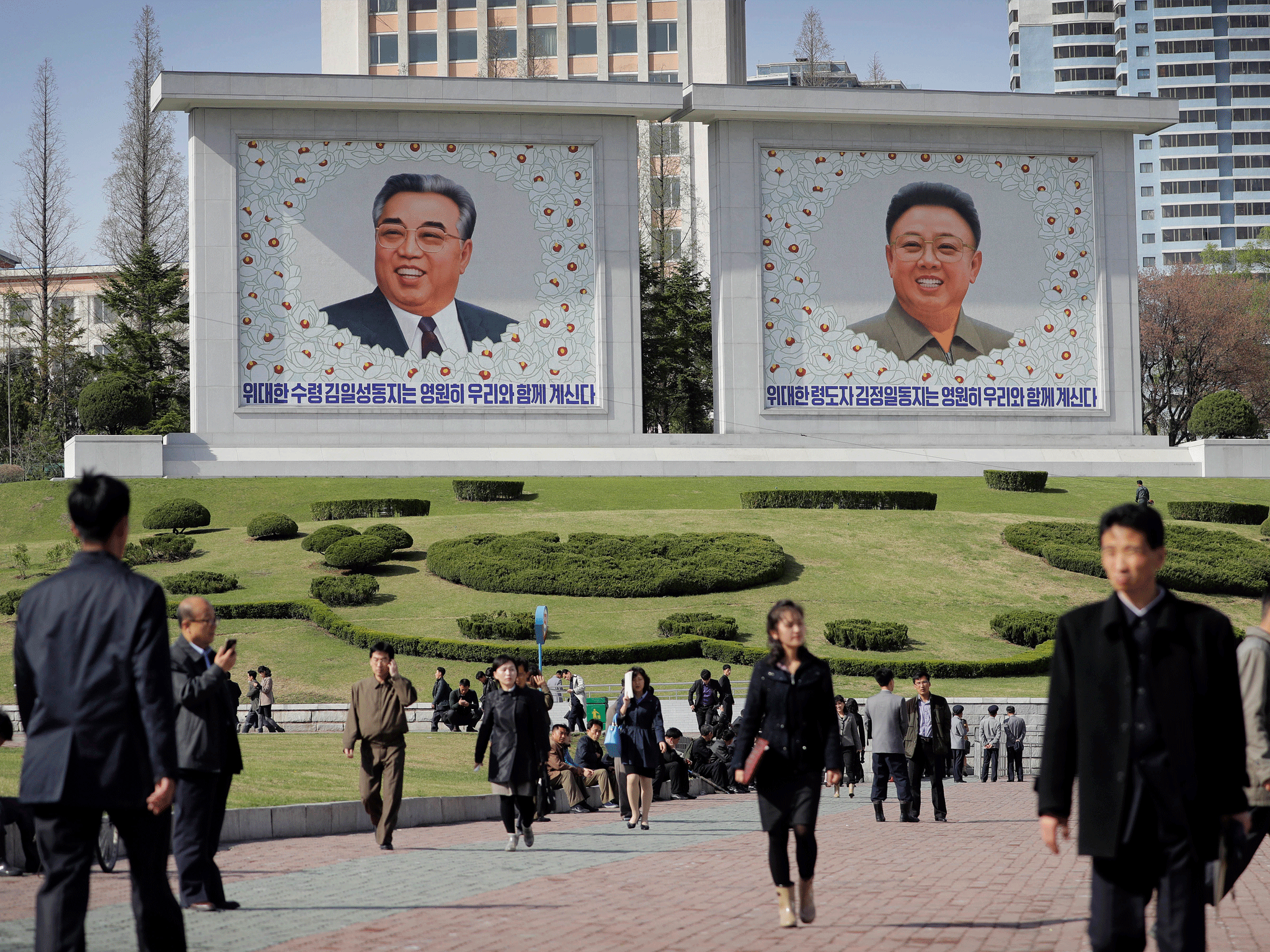Undermine North Korea's nuclear ambitions with pro-Western propaganda, says former ambassador
Exclusive: Increase the amount of information smuggled into isolated state, says retired diplomat who established first UK embassy in Pyongyang

Britain must “step up” efforts to undermine the leadership of North Korea using information from the outside world smuggled into the country to deal with an increasingly belligerent Kim Jong-un, rather than aping American threats of war, the UK's first ambassador to North Korea has said.
Speaking to The Independent after a tense two weeks in which the North Korean leadership warned that "thermonuclear war may break out at any moment", David Slinn said Britain and its allies should “infiltrate" the isolated state by disseminating USB sticks loaded with educational material that encourages free speech and criticism of the leadership.
He said that would act as a powerful tool to sow dissent and undermine the top tiers of the regime without resorting to military action.
Mr Slinn, the first and longest-serving British Ambassador to North Korea between 2002 and 2006, said encouraging North Koreans to question their ‘supreme leader’ was key to bringing about a peaceful solution to the crisis.
The practise of shipping USB sticks loaded with banned South Korean films and news from the outside world has long been used by defectors to undermine the regime.
But Mr Slinn is rare among former UK diplomatic staff in openly calling for the technique to be used.
"There is a very strong case for the international community to step up the efforts to infiltrate more information into North Korea," he said. "The channels exist and obviously the USB sticks are getting in.
"Let's increase the amount of information that is going in there and increase the range of information.
"North Korea's education system does not encourage critical thinking, so why can't we put on these USB sticks some developmental tools to encourage North Koreans to start thinking for themselves and asking the right questions."
Last year the Human Rights Foundation launched an appeal for donations of old USB sticks which could be loaded with material such as the Korean language version of Wikipedia
Earlier this week, Vice President Mike Pence warned that the patience of the US and its allies had "run out".
But Mr Slinn, who now lives in Ottawa, cautioned against a knee-jerk response that tipped the region – and the world – into conflict.
"It is very easy to start panicking and say 'oh my God, we've got no time, nuclear North Korea is on us and it's all horrendous'," the retired diplomat said, "but a military confrontation does not necessarily follow."
"There is no doubt that North Korea has pursued the strategic objective of acquiring an independent nuclear capability.
"They are clearly making progress with it, and that represents a significant threat to regional and international security.
"But if we put it in perspective, North Koreans have been able to hit Seoul with conventional missiles for many years now.
"Clearly the threat is getting bigger, and it is a threat the international community would rather not have to deal with, not least because the regime is rather unpredictable.”
But he added that diplomatic channels remained the best option for deescalating the crisis, while sanctions should stay on the table: "The idea of having an embassy on the ground, talking to officials, reinforcing messages, seeing how officials react, the few quiet conversation that you get to have, they are valuable contributions."
His comments are likely to be interpreted as a veiled criticism of Donald Trump and his inner circle, whose bellicose rhetoric and bombing of targets in Syria and Afghanistan has raised the stakes in an already volatile stand-off between two nuclear militaries.
Britain is one of the few European countries with an embassy in North Korea, and Mr Slinn, who now lives in Canada but continues to work on getting more outside information into the DPRK, said the existence of diplomatic staff in Pyongyang gave the UK privileged access to the pariah state.
It was revealed this week that North Korea has received more than £4 million in UK aid in the last six years, a figure criticised by former Tory defence minister Sir Gerald Howarth as "completely absurd".
But Mr Slinn, who went on to head the UK's embassy in Croatia between 2012 and 2015, said there was a case for increasing British Government spending in the country.
He said it should not be considered aid money but rather political funding as it was being used for political objectives rather than developmental ones.
Asked about an increase in funding, he said: "If the embassy staff can get doors open for conversations with people, especially outside Pyongyang, then there is a case for that.”
Subscribe to Independent Premium to bookmark this article
Want to bookmark your favourite articles and stories to read or reference later? Start your Independent Premium subscription today.

Join our commenting forum
Join thought-provoking conversations, follow other Independent readers and see their replies